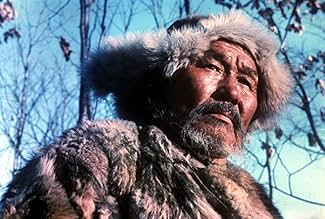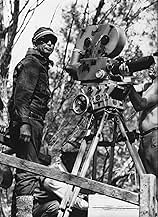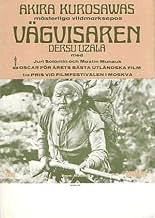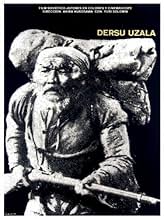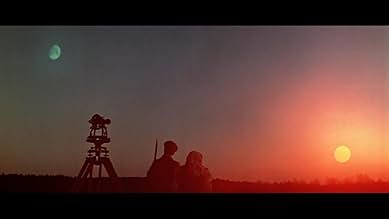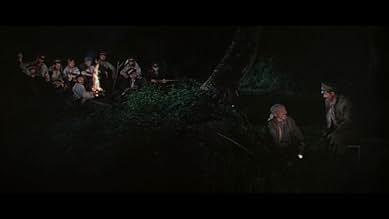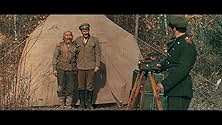CALIFICACIÓN DE IMDb
8.2/10
35 k
TU CALIFICACIÓN
El ejército ruso envía a un explorador en una expedición a la nevada estepa siberiana, donde se hace amigo de un experimentado cazador local.El ejército ruso envía a un explorador en una expedición a la nevada estepa siberiana, donde se hace amigo de un experimentado cazador local.El ejército ruso envía a un explorador en una expedición a la nevada estepa siberiana, donde se hace amigo de un experimentado cazador local.
- Dirección
- Guionistas
- Elenco
- Ganó 1 premio Óscar
- 8 premios ganados y 1 nominación en total
Mikhail Bychkov
- Otryad Arseneva
- (as M. Bychkov)
Vladimir Khrulyov
- Otryad Arseneva
- (as V. Khrulyov)
Stanislav Marin
- Otryad Arseneva
- (as S. Marin)
Igor Sykhra
- Otryad Arseneva
- (as I. Sykhra)
Vladimir Sergiyakov
- Otryad Arseneva
- (as V. Sergiyakov)
Yanis Yakobsons
- Otryad Arseneva
- (as Ya. Yakobsons)
Vladimir Khlestov
- Otryad Arseneva
- (as V. Khlestov)
Vladimir Sverba
- Otryad Arseneva
- (as V. Sverba)
Vladimir Kremena
- Turtygin
- (as V. Kremena)
Aleksandr Pyatkov
- Olenev
- (as A. Pyatkov)
- Dirección
- Guionistas
- Todo el elenco y el equipo
- Producción, taquilla y más en IMDbPro
Opiniones destacadas
Akira Kurosawa was a masterful director and powerful storyteller, Dersu has always been my favourite of his films. It was also the first I saw - on Christmas Day afternoon 1978 on UK BBC2 - would that they were as adventurous nowadays! Since then of course I've seen all of his films from Stray Dog on, Rashomon and Ran being especial favourites, but I keep on coming back to watch this one, ostensibly the simplest tale Kurosawa ever filmed.
The understanding and bonding that develops between the two men Arseniev and Dersu is wonderful to see, and over two hours holds your attention with expertly observed minutiae of character and scenic interplay. The last ten minutes cover a lot of ground (no pun intended) but it's all so logical and sad that I always need to see the end credits to recover.
So many marvellous scenes: the tiger in the forest in the morning; the phlegmatic reclusive old Chinaman; the raft; wispy blue shaded smoke from night-fires; the conclusion of course; the view of those two great men, the Moon and the Sun in the same shot. Not everyone would like Dersu, their most likely comments being "boring" - but how wrong they are they'll never know!
A film not fit to lick Dersu Uzala's metaphorical boots (or even Plan 9 from Outer Space's for that matter), Blazing Saddles was filmed the same year in America and a generation on still gets more praise than this poetic masterpiece!
The understanding and bonding that develops between the two men Arseniev and Dersu is wonderful to see, and over two hours holds your attention with expertly observed minutiae of character and scenic interplay. The last ten minutes cover a lot of ground (no pun intended) but it's all so logical and sad that I always need to see the end credits to recover.
So many marvellous scenes: the tiger in the forest in the morning; the phlegmatic reclusive old Chinaman; the raft; wispy blue shaded smoke from night-fires; the conclusion of course; the view of those two great men, the Moon and the Sun in the same shot. Not everyone would like Dersu, their most likely comments being "boring" - but how wrong they are they'll never know!
A film not fit to lick Dersu Uzala's metaphorical boots (or even Plan 9 from Outer Space's for that matter), Blazing Saddles was filmed the same year in America and a generation on still gets more praise than this poetic masterpiece!
9vdg
..and his name was Akira Kurosawa. Once upon a time there was a simple man: a hunter, and simple story of friendship and reflection about life. Once upon a time a magnificent director and film crew have put a beautiful story on the screen with such perfection, that in our days we look back and we wonder: why movies like this are not being made anymore??
It doesn't matter if you like any other Kurosawa's works or any other 'Russian' films, because this one would touch you so much that you would go back and looked for similar films I wish I could see this film in all his beauty: on a big screen, in the original format (70 mm), as I felt that I missed a lot of details from the TV format.
There are directors and there is Kurosawa, there are dramas and there are Russian stories, so when you put both of them together, what do you get? Dersu Uzala!
Enjoy it, at least as much I did
It doesn't matter if you like any other Kurosawa's works or any other 'Russian' films, because this one would touch you so much that you would go back and looked for similar films I wish I could see this film in all his beauty: on a big screen, in the original format (70 mm), as I felt that I missed a lot of details from the TV format.
There are directors and there is Kurosawa, there are dramas and there are Russian stories, so when you put both of them together, what do you get? Dersu Uzala!
Enjoy it, at least as much I did
10hartj-1
A wonderful film. It showcases the natural beauty of the Taiga and presents a contrast between the technological and the pastoral. Dersu is one with the forest. He knows its ways and its moods. The Russians scoff at his ways and his 'primitive' belief system, but eventually come to rely on him, and even love him. It is a beautiful story that takes place in an world that very few of us in the West have had a chance to see. I thought the fact that the film was set in the pre-revolutionary period gave it a peculiar sort of charm - Russia before the Great War and the Russian Revolution was innocent and even naive, the same way the Russian soldiers were innocent of the wonders and the dangers of the Taiga. One of the things I loved most about this film was the cinematography - there are long, lingering shots of the landscape, the endless steppe, the forest, the rivers, the mountains. We believe ourselves to be powerful because we have been moderately successful in our attempts to harness nature for our own uses, but the film shows us that we are deluding ourselves, that nature cannot be controlled or resisted, and the truly powerful are those, like Dersu, who co-exist in harmony with nature and learn what the wilderness teaches.
This 1975 joint Japanese-Russian film is a celebration of simple virtues, friendship, loyalty, love, and respect for nature. Based on the journals of the Tsarist explorer and surveyor, Captain Vladimir Arseniev, it is the story of the relationship between Captain Arseniev and an Asiatic hunter of the Goldi tribe named Dersu Uzala. With a love and understanding of the forest that is extraordinary, Dersu guides the Captain through several deadly encounters. He saves the Captain's life by building a shelter out of reeds during a ferocious wind storm. Maksim's performance as Dersu, the ancient woodsman, is very "Yoda-like": wonderous, dignified, and very natural.
The friendship between the two main characters grows over many years and several expeditions in the wild. Their relationship is beautifully developed and moves to an inevitable climax when Dersu and the Captain move back to the Captain's home in the city.
There is in this film a sense of the beauty, tranquility, and timelessness of nature. It takes place at a time in the early part of the last century when people had closer ties with nature and felt a kinship with animals, plants, and the elements. Dersu endearingly refers to all elements of nature including the river, the wind, the trees, and the animals as "men". As the English writer, Hugh Trevor-Roper said of Shakespeare so it is true of Dersu, "He sees mankind almost as part of nature, sometimes basking in a delightful, smiling Nature; sometimes caught up in a fierce, cruel, inexorable, insatiable Nature".
I was totally absorbed in this film and in its regard for the essential goodness of man and the beauty of the natural world. Dersu Uzala is a great film from one of the all-time masters.
The friendship between the two main characters grows over many years and several expeditions in the wild. Their relationship is beautifully developed and moves to an inevitable climax when Dersu and the Captain move back to the Captain's home in the city.
There is in this film a sense of the beauty, tranquility, and timelessness of nature. It takes place at a time in the early part of the last century when people had closer ties with nature and felt a kinship with animals, plants, and the elements. Dersu endearingly refers to all elements of nature including the river, the wind, the trees, and the animals as "men". As the English writer, Hugh Trevor-Roper said of Shakespeare so it is true of Dersu, "He sees mankind almost as part of nature, sometimes basking in a delightful, smiling Nature; sometimes caught up in a fierce, cruel, inexorable, insatiable Nature".
I was totally absorbed in this film and in its regard for the essential goodness of man and the beauty of the natural world. Dersu Uzala is a great film from one of the all-time masters.
This is one of my definite favorites.It tells a story of a man who is one with the wilderness and nature and cant live any other way.Dersu Uzala is an old Goldi(siberian asiatic minority) hunter who thinks he has been cursed after he kills a tiger.To him,every being,every part of the nature is equally worth as humans.
The film gives us accounts of one Russian captain's friendship with Dersu.They are together through thick and thin and Dersu even rescues him from a blizzard when they are stuck on a frozen lake.Dersu has all the natural senses and therefore knows when he is in danger.He knows everything by looking and observing the landscape around him.
So when he kills the tiger,its like a spell has been cast on him.Or is it just his imagination?His people believe in a ghost that rules the taiga,Kanga.He thinks Kanga will punish him in some way.Soon his fears start to get real.He cant kill his prey for food that he needs for living because his eyesight dramatically worsens.One frightening night(my favorite scene) it gets too much for him,listening to the howling wind in the dark,waiting for Kanga to send a tiger to kill him.And captain Arseniev,seeing the horror that struck him,offers him to come with him to his hometown.It happens so.
Throughout the film,you cant help but wonder what will happen to Dersu.Not only because in the beginning Arseniev searches for his grave,in retrospection,but also because he is one lonely,sad man who lives only by hunting.There is no place for him but the taiga.And when the tragedy happens,its hard not to feel remorse and pity the old Dersu.His world has come crashing down.The end specially is painful and shows that there is no mercy in this world for a man who falls from grace in his own homeground.
In the end,this film has outstanding photography,outstanding music,outstanding cast,beautiful scenery and do i need to say anything about the director? A timeless work that can never be surpassed.
The film gives us accounts of one Russian captain's friendship with Dersu.They are together through thick and thin and Dersu even rescues him from a blizzard when they are stuck on a frozen lake.Dersu has all the natural senses and therefore knows when he is in danger.He knows everything by looking and observing the landscape around him.
So when he kills the tiger,its like a spell has been cast on him.Or is it just his imagination?His people believe in a ghost that rules the taiga,Kanga.He thinks Kanga will punish him in some way.Soon his fears start to get real.He cant kill his prey for food that he needs for living because his eyesight dramatically worsens.One frightening night(my favorite scene) it gets too much for him,listening to the howling wind in the dark,waiting for Kanga to send a tiger to kill him.And captain Arseniev,seeing the horror that struck him,offers him to come with him to his hometown.It happens so.
Throughout the film,you cant help but wonder what will happen to Dersu.Not only because in the beginning Arseniev searches for his grave,in retrospection,but also because he is one lonely,sad man who lives only by hunting.There is no place for him but the taiga.And when the tragedy happens,its hard not to feel remorse and pity the old Dersu.His world has come crashing down.The end specially is painful and shows that there is no mercy in this world for a man who falls from grace in his own homeground.
In the end,this film has outstanding photography,outstanding music,outstanding cast,beautiful scenery and do i need to say anything about the director? A timeless work that can never be surpassed.
¿Sabías que…?
- TriviaAkira Kurosawa had hoped to make this film as early as in the 1950s, but he had trouble adapting the story to a Japanese setting, never thinking that one day he would actually be able to film it on location in Russia, and with Russian actors.
- ErroresWhen Dersu and Arsenev are looking at the 3/4 moon and the setting sun, the moon is in the wrong phase to appear in the sky at the same time as the sun.
- Citas
Dersu Uzala: How can people live in a box?
- ConexionesFeatured in For the Love of Movies: The Story of American Film Criticism (2009)
Selecciones populares
Inicia sesión para calificar y agrega a la lista de videos para obtener recomendaciones personalizadas
- How long is Dersu Uzala?Con tecnología de Alexa
Detalles
- Fecha de lanzamiento
- Países de origen
- Sitio oficial
- Idiomas
- También se conoce como
- Uzala, der Kirgise
- Locaciones de filmación
- Productoras
- Ver más créditos de la compañía en IMDbPro
Taquilla
- Presupuesto
- USD 4,000,000 (estimado)
- Total a nivel mundial
- USD 14,480
- Tiempo de ejecución2 horas 22 minutos
- Color
- Relación de aspecto
- 2.20 : 1
Contribuir a esta página
Sugiere una edición o agrega el contenido que falta


